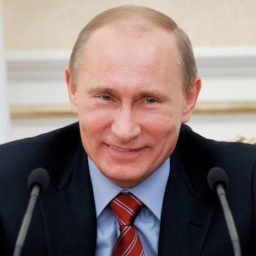Russia’s fiscal remedies for the coronavirus and oil price crises will suit its bigger, state-influenced companies.

Clara Ferreira Marques is a Bloomberg Opinion columnist covering commodities and environmental, social and governance issues. Previously, she was an associate editor for Reuters Breaking views, and editor and correspondent for Reuters in Singapore, India, the U.K., Italy and Russia.
Vladimir Putin has steadily expanded the Russian state’s involvement in an economy that’s increasingly dominated by large companies. The coronavirus crisis, with its lopsided financial assistance that benefits big employers more than entrepreneurs, looks set to continue this process. In the short term, this will strengthen the hand of a vulnerable president. Over the longer term, it spells stagnation.
Governments almost everywhere have had to intervene in their industries over the past few months as they scramble to contain the fallout from Covid-19, bailing out airlines, carmakers and more. Moscow, though, has been slowly broadening its own economic presence since the early 2000s, constructing a corporate landscape that now leans on fewer sectors, with fewer competitors — a phenomenon heightened by international sanctions and a policy of self-reliance.
Russia’s fiscal remedies for the coronavirus and oil price crises will suit the bigger, state-influenced companies. Smaller, private employers, already struggling in an inhospitable business environment, will get more limited backing. Only 13% of small and medium-sized companies say they will definitely survive, according to figures cited this week by a former finance minister, Alexei Kudrin.
Recent announcements on further assistance for the economy are encouraging, but they come late, and they will be paid for out of a broader pandemic response budget that is currently estimated at just 3.5% of last year’s gross domestic product, according to Bloomberg Economics. Only part of this — between 0.8% and 1.7% of GDP — is expected to be the kind of new discretionary spending that would really support smaller business owners. Help in the form of tax deferrals and similar measures, which are part of the same financial package, will benefit larger companies and state entities more than those who simply need cash to keep paying wages and suppliers.
Establishing how much of the economy the Russian state already controls isn’t straightforward. Estimates that put the share at 60%-70% of GDP may be excessive. Calculations discussed in a recent paper published by the International Monetary Fund came in at closer to one-third of GDP in 2016, less remarkable by global standards. The Center for Strategic Research, a Russian think tank, assesses that the share was probably 46% in 2016. In employment terms, the IMF study estimates that the state accounts for roughly half of jobs in the formal work sector. That’s high, though similar to what one sees in Scandinavia.
Yet the state’s influence in Russia goes beyond direct involvement. It is also discerned through the allocation of resources, through the way state watchdogs execute their roles and even through procurement. The presence is felt most strongly in the strategic sectors that dominate the country’s economy — energy, transport, mining and banking — and where nationalization efforts have been concentrated. State-owned lenders, for example, represent more than two-thirds of the banking system by assets.
This situation is bad news for private companies with no state links, especially the SMEs — often consumer-facing — that have borne the brunt of the coronavirus lockdowns. SMEs already make up a meager one-fifth of Russia’s GDP, compared to 50% or 60% among the OECD group of mostly advanced economies. They take an even smaller share of business loans. The temporary shuttering of businesses and spending power sapped by low crude prices are hurting already weak entrepreneurs, and with them hopes for a better balance between strategic sectors and more efficient, competitive private markets.
Richard Connolly, director of the Centre for Russian, European and Eurasian Studies at the University of Birmingham, points out that the tough business environment may have made these minnows more financially resilient than peers elsewhere. That will be an advantage if the country’s Covid-19 shelter-in-place orders lift swiftly.
Even so, large companies, including state enterprises in national resources and heavy industry, have a record of sucking up financial help in a crisis. They gobble up weaker rivals too. And you can hardly blame the government for propping up its biggest employers. The risk of high-profile job losses and unrest sits with the behemoths, and officials have levers they can pull with these companies. Putin has used these effectively in the past.
The state ties mean heavyweights also know their place, and they’ve stepped in to do their bit on Covid-19. Alexey Mordashov’s steelmaker Severstal PJSC and billionaire Vladimir Potanin’s MMC Norilsk Nickel PJSCpaid out coronavirus bonuses to workers, and many more contributed to hospitals and supplies.
All of this strengthens the patronage links that underpin Putin’s regime. That’s good for the president, but less helpful for the future prospects of a hydrocarbon-heavy economy that’s starved of private investment and lagging behind in innovation, despite top-down efforts from Moscow.
Ever-closer union with the resource giants also makes hopes of a green-tinged stimulus plan more distant, despite Russia’s overdependence on oil in a world moving away from its use. If the country doesn’t adapt to the energy transition, its growth may be capped at 0.8% a year over the next two decades, according to the Kremlin-funded Skolkovo Energy Center.
Maybe big isn’t so beautiful.
Leave a comment
